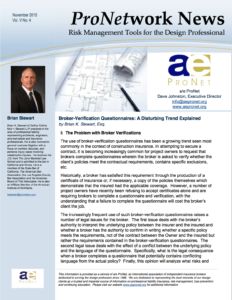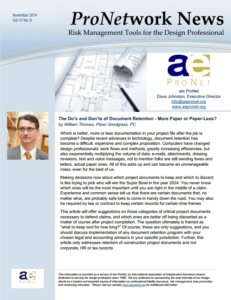 In what attorney Brian Stewart calls a “disturbing trend,” more and more project owners design professionals to procure separate questionnaires from their insurance brokers. These “broker-verification questionnaires” are meant to re-state or re-affirm the limits, exclusions, etc. of the relevant insurance policies to the project. If you’re an architect or engineer who has met push-back from your broker on this issue, our November 2015 issue of ProNetwork News explains why:
In what attorney Brian Stewart calls a “disturbing trend,” more and more project owners design professionals to procure separate questionnaires from their insurance brokers. These “broker-verification questionnaires” are meant to re-state or re-affirm the limits, exclusions, etc. of the relevant insurance policies to the project. If you’re an architect or engineer who has met push-back from your broker on this issue, our November 2015 issue of ProNetwork News explains why:
I: The Problem with Broker Verifications
The use of broker-verification questionnaires has been a growing trend seen most commonly in the context of construction insurance… Historically, a broker has satisfied this requirement through the production of a certificate of insurance or, if necessary, a copy of the policies themselves which demonstrate that the insured had the applicable coverage. However, a number of project owners have recently been refusing to accept certificates alone and are requiring brokers to complete a questionnaire and verification, with the understanding that a failure to complete the questionnaire will cost the broker’s client the job.
The increasingly frequent use of such broker-verification questionnaires raises a number of legal issues for the broker. The first issue deals with the broker’s authority to interpret the underlying policy between the insurer and the insured and whether a broker has the authority to confirm in writing whether a specific policy meets the requirements, not of the contract between the Owner and the insured but rather the requirements contained in the broker-verification questionnaires. The second legal issue deals with the effect of a conflict between the underlying policy and the language of the questionnaire. Specifically, what is the legal consequence when a broker completes a questionnaire that potentially contains conflicting language from the actual policy? Finally, this opinion will analyze what risks and liabilities a broker is exposed to when completing a questionnaire that contains language that is in conflict with or amends, modifies, expands, etc. the underlying policy.
II: Principles of Contract
Insurance is a matter of contract governed by the rules of contract. Unlike the ordinary commercial contract where the parties seek to ensure a commercial advantage for themselves, an insurance contract seeks to obtain some measure of financial security and protection against calamity for the insured.
Being a voluntary contract, as long as the terms and conditions made therefor are not unreasonable or in violation of legal rules and requirements, the parties may make it on such terms, and incorporate such provisions and conditions as they would see fit to adopt. The rights and obligations of parties to an insurance contract are determined by the language of the contact and the insurance policy is the law between the parties unless the contractual provisions are contrary to public opinion or law.
III: Role of the Broker
An insurance broker provides a professional service for the insured, its client and goes to the insurance market to determine what policy or policies best fit the needs of its clients.
Relevant distinctions exist between an insurance agent and an insurance broker. Whereas an agent generally represents a particular insurance company, an insurance broker generally represents only the insured. Consequently, an insurance broker owes a duty to the insured and not the insurer. Continue reading “The Down-Low on Broker-Verification Questionnaires”






